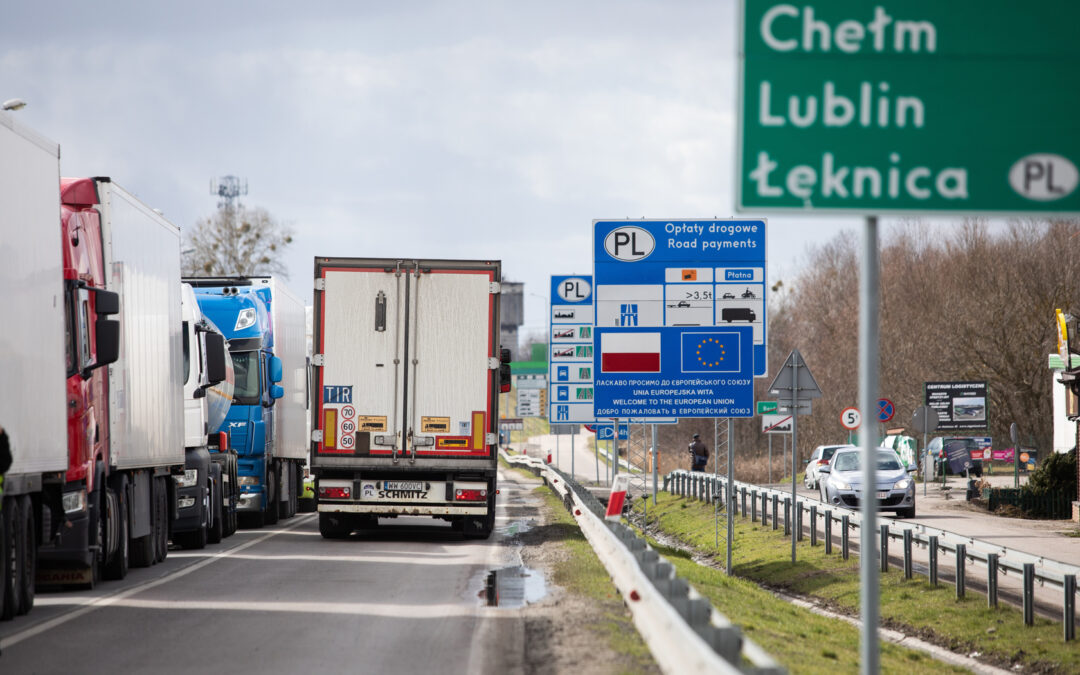One in five small and medium-sized businesses in Poland have already had to limit their operations as a result of the war in Ukraine and sanctions on Russia and Belarus, according to a new survey. The same proportion of companies are concerned that they will not survive the crisis.
The war has caused particular disruption for transport and logistics companies – many of which operate over Poland’s eastern borders and employ Ukrainian staff – while firms in the southeastern region bordering Ukraine express the strongest fears about the future.
The survey, carried out by Quality Watch for the BIG InfoMonitor debtors register three weeks after the beginning of the Russian invasion in Ukraine, found that 20% of companies had seen a reduction in operations, reports the Polish Press Agency (PAP).
As well as problems with staffing, these had been caused by difficulties with supply chains, purchasing intermediates and raw materials, and sales. Well over half of small and medium enterprises (56%) considered negative effects of the war inevitable.
One fifth of firms also expect that the war might force them to suspend operations or close down completely, the survey revealed. As many as a third of transport companies and a quarter of trading firms see this as a possibility.
Such concerns were expressed particularly by companies whose business involves contacts with Ukraine, Russia and Belarus (72%), but also almost half of those operating on the domestic market (47%).
This is because the knock-on effects of the war mean an increase in fuel and energy costs as well affecting the availability of resources and contractors’ fees.
Just 7% of businesses said their operations had increased. They cited an increased interest from foreign partners in working with Polish companies as a result of eastern markets being cut off.
Poland’s government has announced plans to “de-Russify” its economy and combat inflation through an “anti-Putin shield”.
The first part of the package aims to lower high food prices, give additional payments to pensioners and invest in gas infrastructure https://t.co/oGCpBkJF9i
— Notes from Poland 🇵🇱 (@notesfrompoland) March 18, 2022
“Much depends on the scale of the dependence and links, because although half of industrial firms declare relations with markets across the eastern border, their areas of business are diversified enough that the war does not threaten their existence too much,” BIG InfoMonitor president Sławomir Grzelczak told PAP.
“It may also turn out that apparently safe partners might also in some way be dependent on Ukraine, Russia and Belarus, with a negative impact on their suppliers and contractors,” Grzelczak added. Payment backlogs can result in a domino effect that can be “deadly”, leading to bankruptcy for some firms, he pointed out.
Transport and logistics firms are the most concerned, the survey shows (61%), followed by those involved in construction, services, and industrial production (57%). The impact on transport companies was immediate, according to BIG InfoMonitor expert Halina Kochalska.
“Many Ukrainian drivers quit work to fight,” she said, quoted by PAP. “It is also hard to speak of any transport to Ukraine, and currently restriction on deliveries of goods to Russia and Belarus is also becoming more and more real.”
Kochalska noted that Ukrainians have also been leaving their jobs in construction, industry and services. Even before the recent mass arrival of refugees, Ukrainians already made up by far Poland’s largest immigrant group, numbering over a million.
Firms in the Podkarpackie Province, which is adjacent to Ukraine and where most of the over two million refugees who have arrived in Poland have crossed the border, are the most worried about the future, with around 80% expressing fears.
A similar result was observed in the Świętokrzyskie Province. Surprisingly, however, in the Lublin Province, which also has a border with Ukraine, only 39% of businesses were concerned.
Main image credit: Jakub Orzechowski / Agencja Gazeta

Ben Koschalka is a translator, lecturer, and senior editor at Notes from Poland. Originally from Britain, he has lived in Kraków since 2005.




















